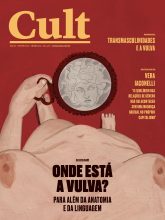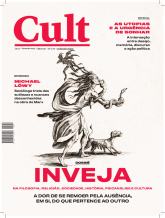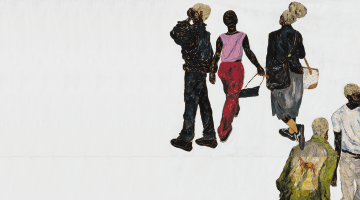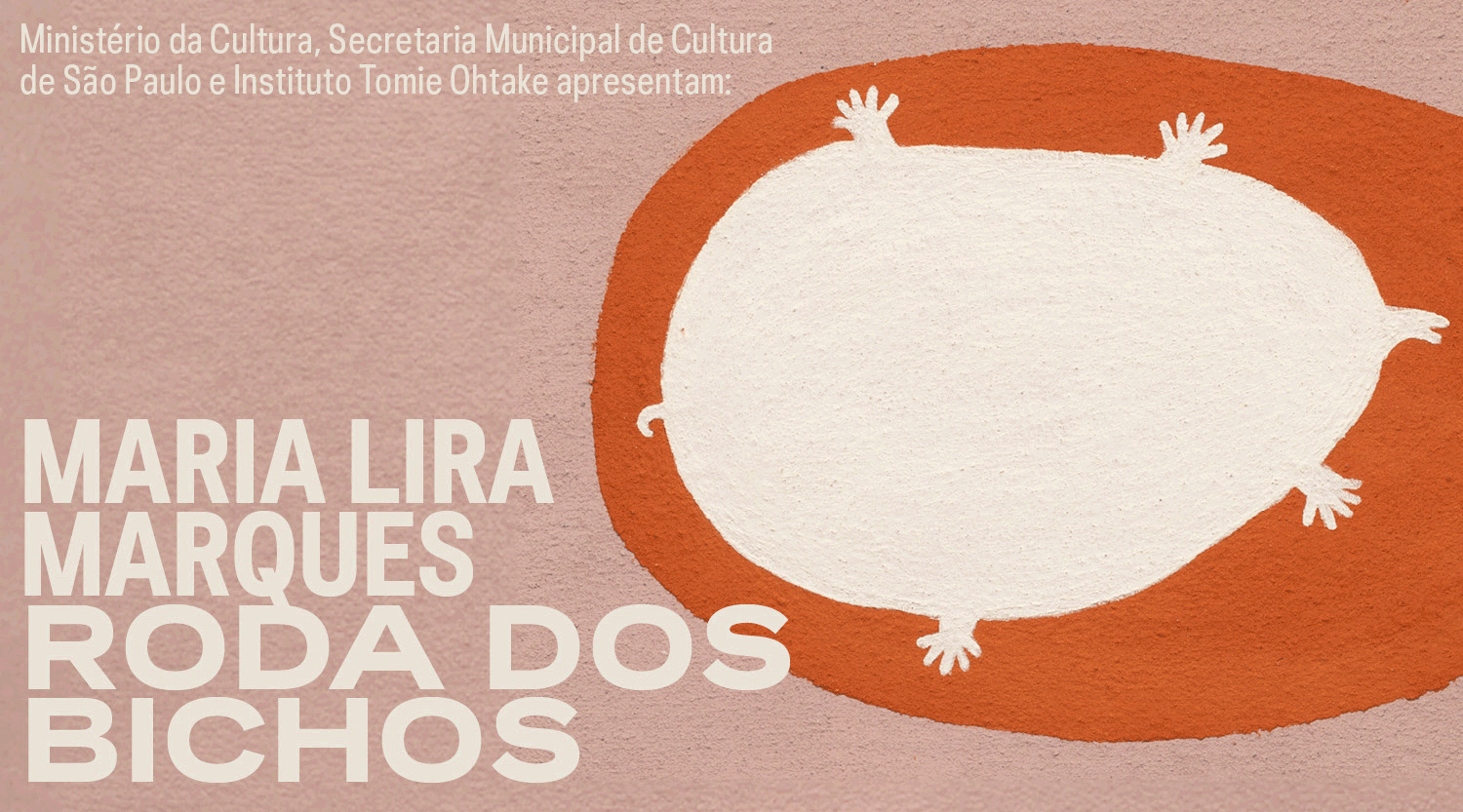Arcas de Babel: Thiago Ponce de Moraes traduz Louise Glück
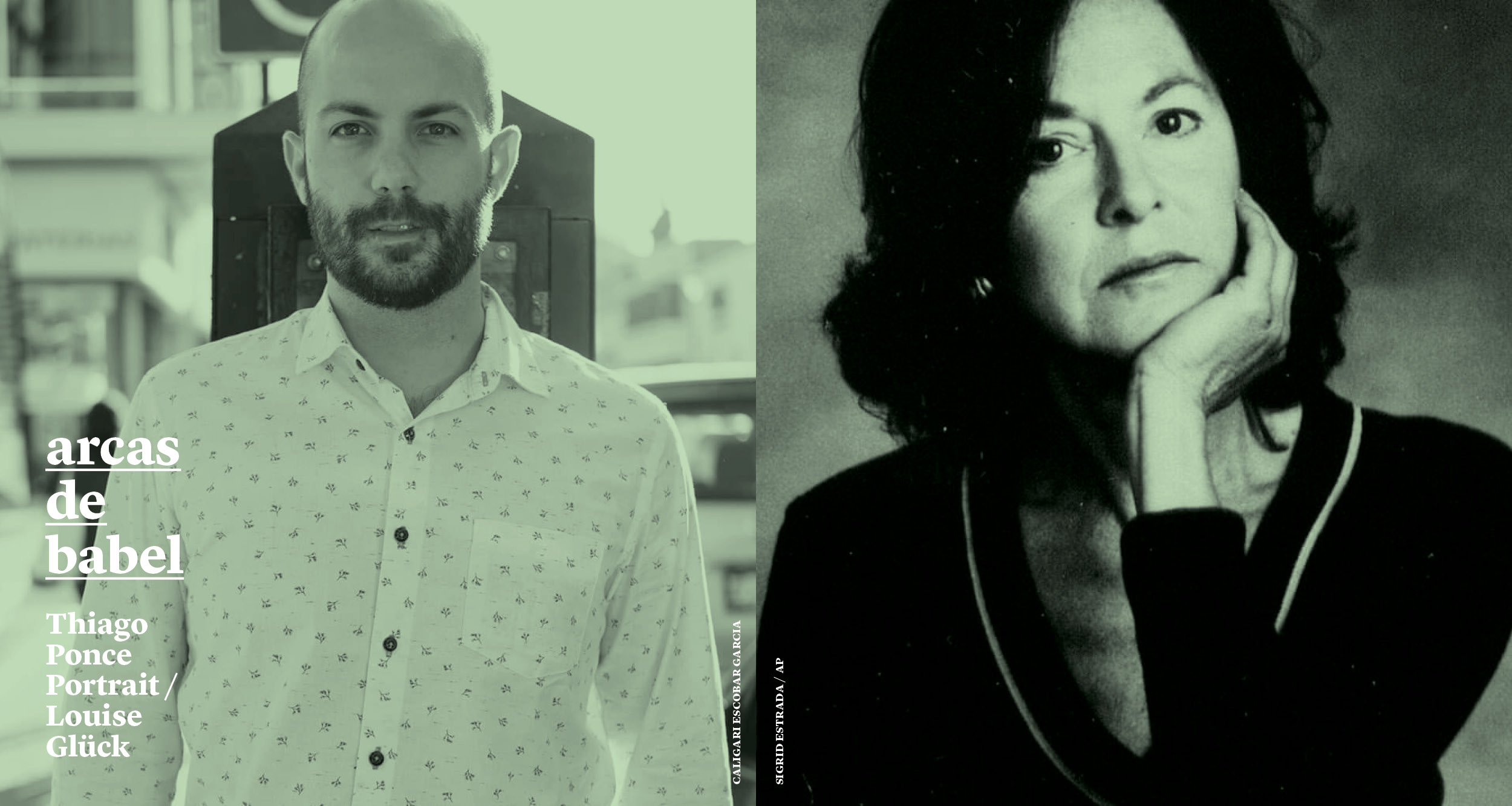
Thiago Ponce de Moraes traduz poemas de Louise Glück (Fotos: Caligari Escobar Garcia e Sigrid Estrada/AP)
A poeta estadunidense Louise Glück, ainda inédita em livro no Brasil, tinha acabado de receber o Prêmio Nobel de Literatura e já começavam a aparecer em blogs e nas redes sociais inúmeras traduções de seus poemas. Essa recepção espontânea, ainda não absorvida pelo mercado editorial, mostra a vitalidade da produção poética contemporânea e sua íntima ligação com a experiência de traduzir. Para dar visibilidade a essas traduções brasileiras já existentes e apresentar a obra de Louise Glück a um público mais vasto, a Arca de Babel desta semana é coletiva.
Essa edição especial reúne traduções de poemas de Louise Glück por seis poetas: Camila Assad, Mariana Basílio, Piero Eyben, Guilherme Gontijo Flores com Adalberto Müller e Thiago Ponce de Moraes, a quem agradeço pelas belas contribuições.
Thiago Ponce de Moras é autor de, entre outros, Dobres sobre a luz (2016, Lumme Editor, finalista do prêmio Jabuti) e Glory Box (2016, Carnaval Press, coletânea bilíngue traduzida pelo poeta britânico Rob Packer). Seu novo livro, Espacelamentos, será lançado pela Gralha Edições e trará desenhos de Priscilla Menezes. É ele quem traduz os poemas “O passado”, “Fragmento arcaico”, “Mãe e filha”, “Vita nova”, “Um mito de devoção” e “O mito da inocência”.
O passado
Pequena luz no céu aparecendo
de repente entre
dois galhos de um pinheiro, suas pontas finas
agora gravadas sobre a superfície radiante
e acima deles
o alto céu emplumado—
Sinta o cheiro. Esse é o cheiro do pinheiro branco,
mais intenso quando o vento sopra por ele
e o som que faz igualmente estranho,
como o som do vento em um filme—
Sombras se movem. As cordas
fazendo o som que fazem. O que você ouve agora
vai ser o som do rouxinol, Chordata,
o pássaro macho cortejando a fêmea—
As cordas mudam. A rede
balança ao vento, presa
com firmeza entre os dois pinheiros.
Sinta o cheiro. Esse é o cheiro do pinheiro branco.
É a voz da minha mãe que você ouve
ou é apenas o som que as árvores fazem
quando o ar passa através delas
porque qual som faria
caso não atravessasse nada?
Fragmento arcaico
Eu tentava amar a matéria.
Colei uma placa no espelho:
Você não pode odiar a matéria e amar a forma.
Era um dia lindo, embora frio.
Foi, para mim, um gesto extravagantemente emocional.
…….seu poema:
tentou, mas não conseguiu.
Colei uma placa sobre a primeira:
Grite, chore, destrua-se, rasgue suas roupas—
Lista de coisas a amar:
lixo, comida, conchas, cabelo humano.
……. o dito
excesso insípido. Então eu
quebrei as placas.
AIAIAIAI gritou
o espelho despido.
Mãe e filha
Somos todos sonhadores; não sabemos quem nós somos.
Alguma máquina nos fez; máquina do mundo, a família restritiva.
Então de volta ao mundo, polidos por chicotes macios.
Nós sonhamos; não nos lembramos.
Máquina da família: pelagem escura, florestas do corpo da mãe.
Máquina da mãe: cidade branca dentro dela.
E antes disso: terra e água.
Musgo entre as pedras, pedaços de folhas e grama.
E antes, células numa grande escuridão.
E antes disso, o mundo velado.
É por isso que você nasceu: para me silenciar.
Células da minha mãe e do meu pai, é a sua vez
de serem cruciais, de serem a obra-prima.
Eu improvisei; eu nunca lembrei.
Agora é a sua vez de serem conduzidas;
são vocês que pedem para saber:
Por que eu sofro? Por que sou ignorante?
Células numa grande escuridão. Alguma máquina nos fez;
é a sua vez de endereçá-la, de voltar perguntando
para que eu sirvo? Para que eu sirvo?
Vita nova
Você me salvou, deveria se lembrar de mim.
A primavera do ano; rapazes comprando tíquetes para os ferryboats.
Risadas, pois o ar está cheio de flores de maçã.
Quando acordei, percebi que era capaz da mesma sensação.
Me lembro de sons como esse da minha infância,
risadas sem motivo, apenas porque o mundo é lindo,
algo assim.
Lugano. Mesas sob as macieiras.
Marinheiros hasteando e arriando bandeiras coloridas.
E na beira do lago, um rapaz joga seu chapéu na água;
talvez sua amada tenha aceitado o pedido.
Sons
cruciais e gestos como
uma trilha posta ante os grandes temas
e depois inutilizada, enterrada.
Ilhas à distância. Minha mãe
oferecendo uma bandeja de bolinhos—
até onde me lembro, não mudou
nada, o momento
vívido, intacto, nunca tendo sido
exposto à luz, tanto que acordei eufórica, na minha época
faminta pela vida, absolutamente confiante—
Perto das mesas, retalhos de grama nova, o verde pálido
remendado no solo escuro existente.
Certamente a primavera retornou a mim, dessa vez
não como um amante mas um mensageiro da morte, mesmo
que ainda seja primavera, que ainda seja dito com ternura.
Um mito de devoção
Quando Hades decidiu que amava esta menina
construiu para ela uma réplica da terra,
tudo igual, até mesmo as pradarias,
mas acrescentou uma cama.
Tudo igual, inclusive a luz do sol,
pois seria muito difícil para uma menina
passar tão rápido da luz do dia para a absoluta escuridão
Aos poucos, ele pensou, introduziria a noite,
primeiro pelas sombras de folhas esvoaçantes.
Então a lua, então estrelas. Então lua alguma, estrela alguma.
Deixe que Perséfone se acostume devagar.
Ao final, ele pensou, ela acharia confortável.
Uma réplica da terra
exceto por haver amor ali.
Amor não é o que todo mundo quer?
Ele esperou muitos anos,
construindo um mundo, observando
Perséfone nas pradarias.
Perséfone, que sentia, que provava.
Se você tiver um apetite, ele pensou,
você tem todos.
Não é o que todo mundo quer sentir à noite
o corpo, a bússola, o norte amado,
escutar a calma respiração que diz
Estou vivo, que significa também
que você está vivo, pois você me ouve,
você está aqui comigo. E quando um se vira,
o outro se vira—
Era o que ele sentia, o senhor das trevas,
olhando para o mundo que tinha
construído para Perséfone. Nunca passou pela sua cabeça
que não se sentiria mais cheiro aqui,
certamente não se comeria mais.
Culpa? Terror? O medo do amor?
Essas coisas ele não poderia imaginar;
um amante nunca imagina isso.
Ele sonha, ele se pergunta como chamar este lugar.
Primeiro ele pensa: O Novo Inferno. Depois: O Jardim.
Ao fim, ele decide chamar de
Infância de Perséfone.
Uma luz suave se levanta sobre as pradarias,
atrás da cama. Ele a toma em seus braços.
Ele quer dizer Eu te amo, nada vai te machucar
mas ele pensa
que isso é uma mentira, então ele diz ao final
você está morta, nada vai te machucar
que para ele parece
um começo mais promissor, mais verdadeiro.
O mito da inocência
Num verão ela vai ao campo como de costume
para um pouco no lago onde frequentemente
se olha, para ver
se detecta alguma mudança. Ela vê
a mesma pessoa, o manto horrível
da filialidade ainda preso a ela.
O sol parece, na água, muito próximo.
Aí está meu tio espiando outra vez, ela pensa—
tudo na natureza é de certa forma seu parente.
Eu nunca estou sozinha, ela pensa,
tornando o pensamento uma prece.
Então a morte aparece, como reposta à prece.
Ninguém entende mais
o quanto ela era bonita. Mas Perséfone se lembra.
Também que ela a abraçou, bem ali,
com seu tio observando. Ela se lembra
da luz do sol reluzindo em seus braços descobertos.
Esse é o último momento de que se lembra com clareza.
Então o deus da escuridão a levou embora.
Ela também se lembra, com menos clareza,
da percepção assustadora de que a partir desse momento
ela não conseguiria viver sem a morte outra vez.
A garota que desaparece do lago
nunca mais vai voltar. Uma mulher vai voltar,
procurando a garota que era.
Ela para perto do lago dizendo, de tempos em tempos,
Eu fui raptada, mas isso soa
errado pra ela, nada como o que ela sentiu.
Então ela diz, Eu não fui raptada.
Então ela diz, Eu me ofereci, eu queria
escapar do meu corpo. E mesmo, às vezes,
Eu quis isso. Mas a ignorância
não pode querer o conhecimento. A ignorância
quer algo imaginado, que ela acredita que exista.
Todos os nomes diferentes—
ela os diz em rotação.
Morte, marido, deus, desconhecido.
Tudo soa tão simples, tão convencional,
Eu devo ser, ela pensa, uma garota simples.
Ela não consegue se lembrar de si mesma como aquela pessoa
mas segue pensando que o lago vai lembrar
e explicar a ela o sentido da sua prece
para que ela possa entender
se foi respondida ou não.
***
The past
Small light in the sky appearing
suddenly between
two pine boughs, their fine needles
now etched onto the radiant surface
and above this
high, feathery heaven—
Smell the air. That is the smell of the white pine,
most intense when the wind blows through it
and the sound it makes equally strange,
like the sound of the wind in a movie—
Shadows moving. The ropes
making the sound they make. What you hear now
will be the sound of the nightingale, Chordata,
the male bird courting the female—
The ropes shift. The hammock
sways in the wind, tied
firmly between two pine trees.
Smell the air. That is the smell of the white pine.
It is my mother’s voice you hear
or is it only the sound the trees make
when the air passes through them
because what sound would it make,
passing through nothing?
Archaic fragment
I was trying to love matter.
I taped a sign over the mirror:
You cannot hate matter and love form.
It was a beautiful day, though cold.
This was, for me, an extravagantly emotional gesture.
…….your poem:
tried, but could not.
I taped a sign over the first sign:
Cry, weep, thrash yourself, rend your garments—
List of things to love:
dirt, food, shells, human hair.
……. said
tasteless excess. Then I
rent the signs.
AIAIAIAI cried
the naked mirror.
Mother and child
We’re all dreamers; we don’t know who we are.
Some machine made us; machine of the world, the constricting family.
Then back to the world, polished by soft whips.
We dream; we don’t remember.
Machine of the family: dark fur, forests of the mother’s body.
Machine of the mother: white city inside her.
And before that: earth and water.
Moss between rocks, pieces of leaves and grass.
And before, cells in a great darkness.
And before that, the veiled world.
This is why you were born: to silence me.
Cells of my mother and father, it is your turn
to be pivotal, to be the masterpiece.
I improvised; I never remembered.
Now it’s your turn to be driven;
you’re the one who demands to know:
Why do I suffer? Why am I ignorant?
Cells in a great darkness. Some machine made us;
it is your turn to address it, to go back asking
what am I for? What am I for?
Vita nova
You saved me, you should remember me.
The spring of the year; young men buying tickets for the ferryboats.
Laughter, because the air is full of apple blossoms.
When I woke up, I realized I was capable of the same feeling.
I remember sounds like that from my childhood,
laughter for no cause, simply because the world is beautiful,
something like that.
Lugano. Tables under the apple trees.
Deckhands raising and lowering the colored flags.
And by the lake’s edge, a young man throws his hat into the water;
perhaps his sweetheart has accepted him.
Crucial
sounds or gestures like
a track laid down before the larger themes
and then unused, buried.
Islands in the distance. My mother
holding out a plate of little cakes—
as far as I remember, changed
in no detail, the moment
vivid, intact, having never been
exposed to light, so that I woke elated, at my age
hungry for life, utterly confident—
By the tables, patches of new grass, the pale green
pieced into the dark existing ground.
Surely spring has been returned to me, this time
not as a lover but a messenger of death, yet
it is still spring, it is still meant tenderly.
A myth of devotion
When Hades decided he loved this girl
he built for her a duplicate of earth,
everything the same, down to the meadow,
but with a bed added.
Everything the same, including sunlight,
because it would be hard on a young girl
to go so quickly from bright light to utter darkness
Gradually, he thought, he’d introduce the night,
first as the shadows of fluttering leaves.
Then moon, then stars. Then no moon, no stars.
Let Persephone get used to it slowly.
In the end, he thought, she’d find it comforting.
A replica of earth
except there was love here.
Doesn’t everyone want love?
He waited many years,
building a world, watching
Persephone in the meadow.
Persephone, a smeller, a taster.
If you have one appetite, he thought,
you have them all.
Doesn’t everyone want to feel in the night
the beloved body, compass, polestar,
to hear the quiet breathing that says
I am alive, that means also
you are alive, because you hear me,
you are here with me. And when one turns,
the other turns—
That’s what he felt, the lord of darkness,
looking at the world he had
constructed for Persephone. It never crossed his mind
that there’d be no more smelling here,
certainly no more eating.
Guilt? Terror? The fear of love?
These things he couldn’t imagine;
no lover ever imagines them.
He dreams, he wonders what to call this place.
First he thinks: The New Hell. Then: The Garden.
In the end, he decides to name it
Persephone’s Girlhood.
A soft light rising above the level meadow,
behind the bed. He takes her in his arms.
He wants to say I love you, nothing can hurt you
but he thinks
this is a lie, so he says in the end
you’re dead, nothing can hurt you
which seems to him
a more promising beginning, more true.
The myth of innocence
One summer she goes into the field as usual
stopping for a bit at the pool where she often
looks at herself, to see
if she detects any changes. She sees
the same person, the horrible mantle
of daughterliness still clinging to her.
The sun seems, in the water, very close.
That’s my uncle spying again, she thinks—
everything in nature is in some way her relative.
I am never alone, she thinks,
turning the thought into a prayer.
Then death appears, like the answer to a prayer.
No one understands anymore
how beautiful he was. But Persephone remembers.
Also that he embraced her, right there,
with her uncle watching. She remembers
sunlight flashing on his bare arms.
This is the last moment she remembers clearly.
Then the dark god bore her away.
She also remembers, less clearly,
the chilling insight that from this moment
she couldn’t live without him again.
The girl who disappears from the pool
will never return. A woman will return,
looking for the girl she was.
She stands by the pool saying, from time to time,
I was abducted, but it sounds
wrong to her, nothing like what she felt.
Then she says, I was not abducted.
Then she says, I offered myself, I wanted
to escape my body. Even, sometimes,
I willed this. But ignorance
cannot will knowledge. Ignorance
wills something imagined, which it believes exists.
All the different nouns—
she says them in rotation.
Death, husband, god, stranger.
Everything sounds so simple, so conventional.
I must have been, she thinks, a simple girl.
She can’t remember herself as that person
but she keeps thinking the pool will remember
and explain to her the meaning of her prayer
so she can understand
whether it was answered or not.


